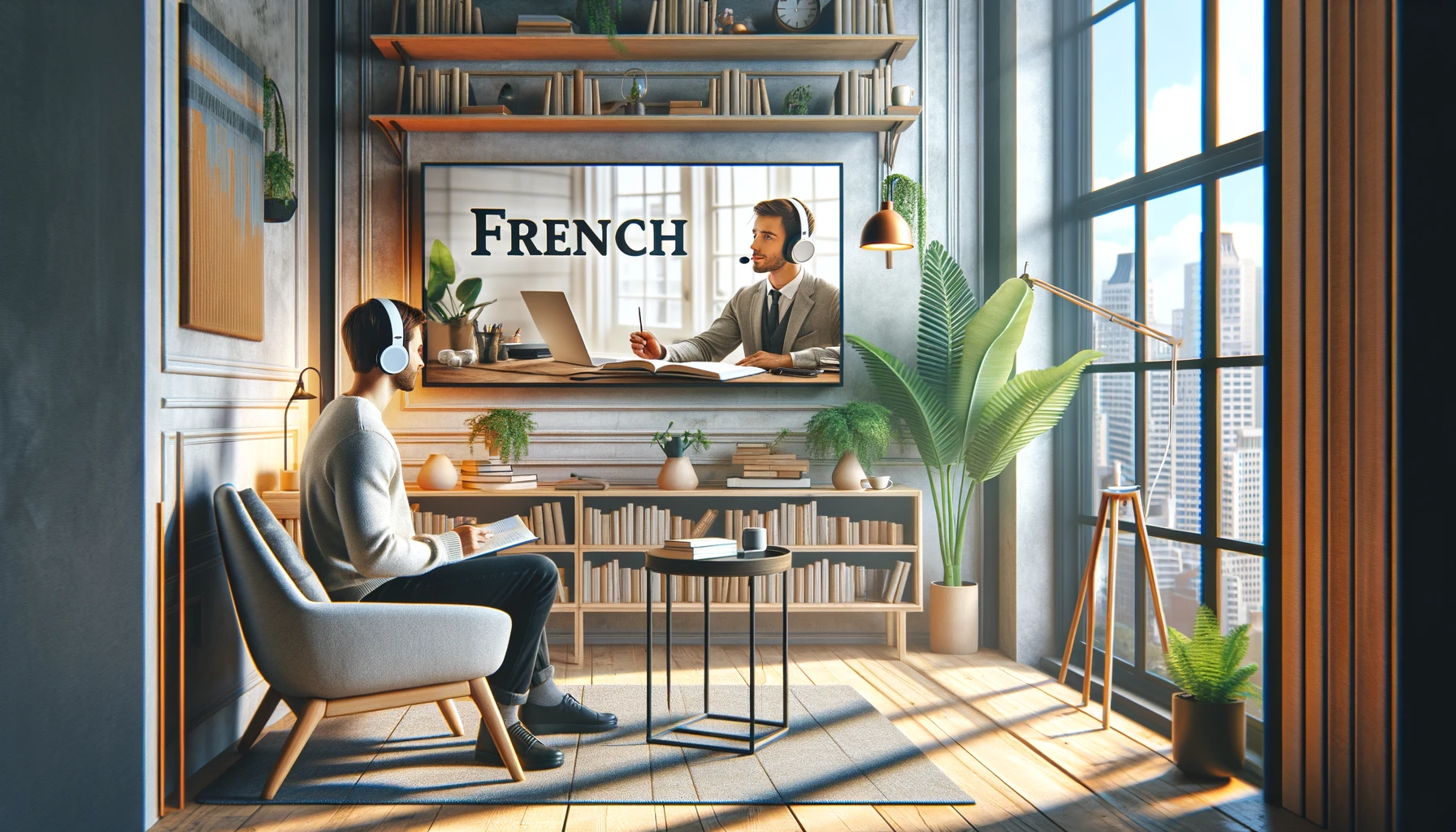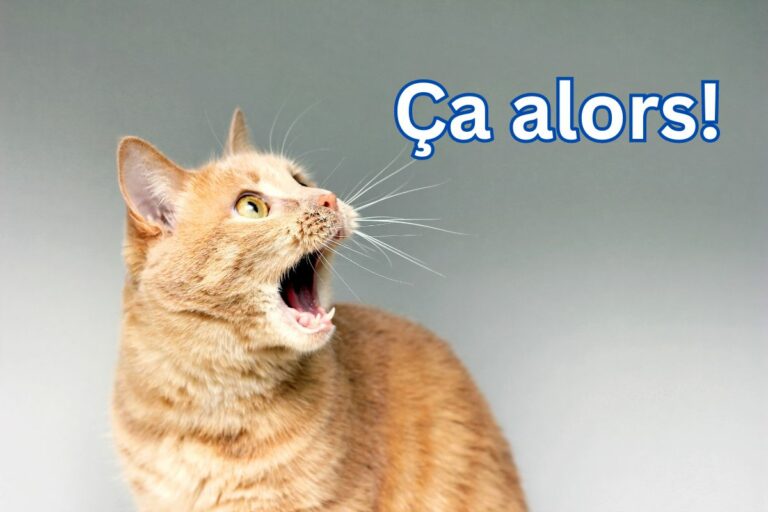How to Speak French Fluently : The Most Effective Approach To Learning
A recurring question among language learners, including French learners, is : how can I learn to actually speak the language. Hundreds of people complain that, despite months or years of language lessons, they are basically helpless when it comes to verbal interactions.
I'd like to share my personal experience about learning spoken languages, and suggest an approach to start speaking French proficiently, leading to fluency at a later stage.
You may have found that taking French lessons is quite effective for learning the basics of the language, helping you build a solid initial foundation for vocabulary and grammar.
But when it comes to speaking, it's a well-known fact that spoken French significantly differs from written French. French courses typically focus on written language, including for teaching speaking skills.
As a result, the knowledge you build through traditional coursework is of limited help when it comes to interact verbally with native speakers. It's almost like you haven't learned anything.
Even with French words that are used both in writing and speaking , as a learner you probably have trouble distinguishing them when you hear them spoken by a native, due to speed and contractions.
For example, the words "petit déjeuner" (breakfast) are typically pronounced "pti déjné" (or sometimes "ptidej"). For the untrained ear, distinguishing the actual words "petit" and "déjeuner" (or "dej") within the speech flow is a challenge.
Another hurdle you may be facing, is that most native French speakers constantly substitute colloquial phrases in place of the words you would normally use in standard French. It almost seems like everyone is playing a game of "don't say the actual words for it - or die".
For example, a French speaker will likely say "je suis un peu à court là" instead of "je n'ai pas beaucoup d'argent en ce moment" (I don't have much money these days). In a traditional language course, however, the second one is what you'll typically be taught.
A third major difficulty when learning to speak French, is the crazy French habit of contracting everything, from single words (see "ptidéj" above) to complete sentences, making them undecipherable to the unprepared learner.
A native French speaker will typically say "chai pas où t'as planqué mon ordi !" instead of "je ne sais pas où tu as caché mon ordinateur" (I don't know where you've hidden my computer). The same phenomenon exists in Portuguese.
So there you have it : you can't learn to speak French fluently by studying French the traditional way. To really learn to speak, you'll need to interact with native speakers in everyday life.
How to speak French fluently : giving the illusion of fluency
But, how can you have any meaningful interaction with a native speaker if you're not capable of producing and/or understanding at least some basic phrases ? It's a chicken and egg situation : to learn to speak you need to interact, but to interact you need to speak some.
I've faced this very challenge several times in my life, as I learned Arabic, English, Spanish, and now Portuguese. Admittedly, it wasn't as bad for English since in my opinion, "classroom English" is closer to everyday spoken English than is the case for French and Portuguese.
How do you get around this challenge when learning spoken French ? The way I've found to be most effective is ... faking. That is, giving native speakers the illusion that you speak and understand the language much better than you actually do.
If you're in a French-speaking country, you can trick the locals you interact into believing you speak French quite well, even though in reality you're just a beginner seeking verbal exposure to build up your verbal skills.
Can you really achieve such an illusion ? Based on my own experience, yes it's possible. You see, the important thing is NOT the quantity of words you know, or how well you conjugate regular or irregular verbs.
What really counts in giving the illusion that you speak French, is being able to say complete, "as-is" phrases with the right tone at the right moment of the conversation. Like a recording.
Let me give you an example based on my own experience : a Portuguese guy I met was learning French and was trying to speak French to me during a friendly lunch.
Early in the conversation, he said, referring to someone he knows : "putain, le mec, il est vraiment incroyable !" I remember thinking, wow this guys really knows how to speak French, he must have lived in France.
As it turned out, his French was quite basic. But just pulling that highly colloquial phrase at the right time in the conversation - and pronouncing it correctly - really bluffed me and gave me the impression he was fluent.
You can create a similar illusion that will facilitate your interactions by leading the native speaker into thinking you speak proficiently. While this happens, you continue to grab new phrases from him/her in context, and the illusion gradually becomes closer to reality.
That's the exact approach I'm using for learning to speak Portuguese. Every time I'm in Portugal, I address people in Portuguese - even though everyone there speaks English . My first sentence often leads the person to think I'm fluent, so she typically responds as she would to a native.
Of course, after a couple sentences, reality takes over and I often start struggling to understand the person's responses. I try guessing their meaning based on the bits and pieces I do catch, and on context. Sometimes I pretend to understand when I only got part of it.
My follow-up sentences rarely stay up to par, too. But when the native speaker finally realizes I'm not as fluent as I intially sounded, she's often amused by the fact I tricked her, and is willing to stay on the illusion path and help me get through the conversation - a huge benefit to me, I make progress in leaps.
Once the initial impression of fluency has been initially set in the native speaker's mind, they will often continue speaking to you in their native language, and keep a favorable image of you as a local person.
As a result of such exchanges, you will become increasingly capable of coming up with a decent second response in spoken French, then a third, and so on. It's a fun game to play, and it's exhilarating.
How to speak French fluently : bootstrap the process
OK, I hear you ask, that's all nice and sweet, but how can I trick a native into thinking I'm a fluent French speaker when I can't even come up with a decent sentence for the life of me !
A great way I've found to bootstrap my fluency illusion skills, is to learn a bunch of complete phrases of everyday language, in context, starting small and building up from there. That really works for me.
That's what I did with Portuguese before heading out to Portugal for the first time : for weeks I listened to simple conversations between native speakers about basic situations of everyday life.
Finding relevant audio conversations between native speakers in actual everyday spoken language that native speakers use is not that easy - it certainly was a challenge in European Portuguese.
Once you get your hands on such real-life French dialogues, you'll need to work hard to listen, repeat and memorizes the phrases that are spoken. I'm not talking about words here, but complete phrases.
Here's an example of such a dialogue in French, a conversation between two friends. In this post, each of the French phrases used in the dialogue are commented and explained, and you can hear and practice their pronounciation with the embedded audio clips.
Now that's 100% pure everyday, colloquial French, the kind you can memorize and reuse to give native speakers the illusion you know how to speak French fluently.
Another valuable and free resource you can use to build you illusion skills is the video lessons on this site. Each lesson is based on a simple, real-life situation and involves a spoken French dialogue that you could have heard just anywhere when staying or travelling in France.
In fact, everything you'll find on this website, including video lessons and articles, is geared toward a single goal : giving you, the learner, the tools you need to bootstrap your speaking skills by giving you a solid foundation in colloquial spoken French, through a range of complete everyday phrases (no matter how un-academic) in their real-life context and with their real-life pronunciation.
In other words, I've set out to provide spoken French learners the content I would have died to find in Portuguese - and Arabic and Spanish many years ago.
So again, listen to the dialogues, watch the videos, understand and repeat the phrases, role play and test yourself. After you do you'll be amazed by how well you can pretend to actually speak French fluently even if you don't.
And that, in turn, will help you become a fluent speaker without you realizing it, through more frequent and better interactions with native French speakers.
How to speak French fluently : comfort vs. effectiveness
One last topic I'd like to discuss here is translation. There's always a lot of debate about whether or not language learners should translate back and forth between their native and target languages for effective language learning.
When I started Bla Bla Francais, one of my guiding principles was "no translation". That's mainly because I personally became a fluent English speaker by "jumping into the river and swimming", with no French translation whatsover - heck my only dictionary was English to English ! And same for Spanish.
For my European Portuguese experience, however, I did not have access to all-Portuguese materials well-suited for a complete beginner. So I settled for audio material with English-Portuguese translations.
But here's the important point : I was hearing and repeating complete phrases of everyday life, as opposed to learning just words or idioms.
That being the case, the translation component was no longer a problem. You see, translation can be harmful when you learn bits and pieces through it, and then try to assemble sentences from the words you've learned based on patterns from your native language.
But if you set out to learn complete phrases in French, even if you hear the translation in your native language, it's the concept you're translating as opposed to individual words. That makes a huge difference.
So the next time you find yourself in a similar situation, the complete phrase you've heard, repeated, and memorized will come to your mind "as-is", and you'll again be creating the illusion of proficiency you need to get the native conversation going.
I still personally prefer to learn directly through full immersion, guessing from context, pictures or video. But doing it this way is hard. You as a learner may prefer a translation-based approach because it's much more comfortable.
Uncertainty and doubt are an incredibly efficient way to learn, but it involves major efforts and is even painful. Using the above approach you can have the cake and eat it too.
To recap, the key to start learning to speak French fluently using a translation approach is to learn complete phrases, and learn to spit them out "as-is" in the right context - vs. custom assembling sentences based on your native language patterns - and with a correct pronunciation.
What next ? Starting building your colloquial French foundation layer
You're all set to get started. Go through the audio articles, watch the free video lessons. Quite of bit of material to take in, particularly if you do it well. You won't be really done until you're able to play the role of any of the characters in these dialogues.
After you've worked through every single conversation on this site, you'll be ready to dive into French-speaking real life. You'll still be jumping into the river, but you'll have a good life jacket on.
I'm also working on a new 100% audio-based AND translation-based lesson series for learning spoken French fast. The new series will be premium, as it's taking me an insane amount of time and effort to create and put together - like the free videos on this site.
If you'd like to be a free beta tester for the new audio lessons series before it's released to the public, subscribe on this site (enter your email in one of the sidebars) and then leave a comment below saying you want to be part of the beta program. I'll get in touch with you soon.
Until next time ... A la prochaine !








My son wants to speak French, so my husband and I are looking for a French-speaking teacher for a more effective approach to his learning. I like your tip on bootstrapping the process by learning a bunch of complete phrases of everyday language — starting small and building up from there. We’ll be sure to consider your suggestion to have our son listen to simple conversations between native speakers about situations of everyday life. Thanks for this!
Conta comigo para o beta program, terei muito gosto em colaborar.